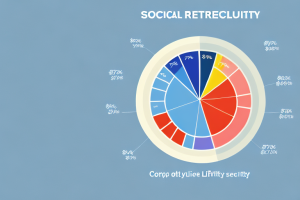In today’s complex world of retirement planning, it is crucial to understand the role Social Security plays in the financial well-being of retirees. Social Security is a government program that provides income support to individuals who have reached retirement age or have become disabled. For many retirees, Social Security benefits serve as a critical source of income during their golden years. However, it is important to examine the percentage of retirees who rely solely on Social Security and the challenges they face when doing so.
Understanding the importance of Social Security for retirees
Social Security serves as a vital safety net for retirees, providing them with a steady stream of income after they leave the workforce. For many individuals, Social Security benefits make up a significant portion of their retirement income. These benefits are designed to replace a portion of pre-retirement earnings and provide financial stability during the later years of life.
While Social Security alone may not provide retirees with a luxurious lifestyle, it often serves as a crucial foundation for their overall financial well-being. Without the support of Social Security, many retirees would face significant challenges in meeting their basic needs.
The financial challenges faced by retirees relying solely on Social Security
Despite its importance, there are limitations to relying solely on Social Security as a source of income in retirement. One of the biggest challenges is the adequacy of benefits. Social Security benefits are determined based on an individual’s earnings history and the age at which they start receiving benefits. For individuals who earned lower wages throughout their working years, the benefits may not be sufficient to cover their expenses, especially as healthcare costs continue to rise.
Another challenge faced by those relying solely on Social Security is the absence of cost-of-living adjustments (COLAs) that adequately keep up with inflation. While Social Security benefits do receive an annual COLA, it may not be enough to offset the rising costs of essential items such as housing, healthcare, and food.
Moreover, retirees relying solely on Social Security may face difficulties in dealing with unexpected expenses, such as medical emergencies or home repairs. These financial shocks can put additional strain on individuals who are already living on a fixed income.
Exploring the impact of Social Security benefits on retirement income
Social Security benefits play a significant role in determining the overall income of retirees. On average, Social Security accounts for approximately 33% of total income for retirees aged 65 and older. For some, Social Security provides a majority of their retirement income, while for others, it may be a supplement to other sources such as pensions, investments, or part-time work.
It is worth noting that the percentage of retirees living solely on Social Security varies considerably. Factors such as educational attainment, income during working years, and access to other retirement savings vehicles all influence the extent to which individuals rely on Social Security as their primary source of income.
Factors influencing the percentage of retirees living on Social Security alone
Several factors contribute to the percentage of retirees who rely solely on Social Security as their primary income source. One of the primary factors is the lack of financial preparation for retirement. Many individuals fail to save enough during their working years, leaving them heavily dependent on Social Security benefits.
The decline of traditional pension plans also plays a significant role. With the shift from defined benefit plans to defined contribution plans, such as 401(k)s, the responsibility for retirement savings has increasingly shifted to the individual. Those without adequate savings may find themselves relying more heavily on Social Security benefits to make ends meet.
Another factor to consider is the issue of early retirement. Some individuals choose or are forced to retire earlier than originally planned due to various factors such as health issues or job loss. Early retirement can lead to a reduced Social Security benefit, exacerbating the financial challenges faced by retirees.
Examining the demographics of retirees dependent on Social Security as their primary income source
Retirees who rely solely on Social Security as their primary income source come from diverse demographic backgrounds. However, certain groups are more likely to depend heavily on these benefits. For example, individuals with lower educational attainment, those who worked in lower-wage industries, and racial or ethnic minorities are more likely to rely predominantly on Social Security.
Women, in particular, face unique challenges when it comes to relying on Social Security. Due to various factors such as interrupted work histories, lower wages, and longer life expectancy, women tend to receive lower Social Security benefits than their male counterparts. This disparity contributes to a higher percentage of women dependent solely on Social Security as their primary income source during retirement.
Analyzing the financial implications of relying solely on Social Security in retirement
Relying solely on Social Security in retirement can have significant financial implications. As mentioned earlier, the adequacy of benefits and the absence of sufficient COLAs can make it challenging to cover essential expenses, let alone enjoy a comfortable retirement. Retirees may have to make difficult choices, such as downsizing their homes, cutting back on discretionary spending, or relying on family members for additional support.
Furthermore, the financial implications extend beyond day-to-day living expenses. Without substantial savings or alternative sources of income, retirees may struggle to cover healthcare costs, pursue leisure activities, or leave a financial legacy for their loved ones. It is essential for individuals to carefully consider how relying solely on Social Security will impact their lifestyle and be proactive in planning for a comfortable retirement.
Debunking common misconceptions about living on Social Security alone in retirement
There are several misconceptions surrounding living on Social Security alone in retirement. One of the most common misconceptions is that Social Security benefits will be enough to maintain a similar standard of living to that held during the working years. However, the reality is that relying exclusively on Social Security typically means a significant reduction in income and a need for careful budgeting.
Another common misconception is that individuals can rely on part-time work to supplement their Social Security benefits. While some retirees may choose to work part-time out of personal preference or financial necessity, it is essential to note that additional earned income can impact the taxation of Social Security benefits and may not always be a feasible option for everyone.
It is crucial to dispel these misconceptions and have a realistic understanding of the limitations and challenges faced by retirees reliant on Social Security as their sole income source.
Strategies for maximizing Social Security benefits to reduce reliance on it as the sole income source in retirement
While Social Security alone may not be sufficient to sustain a comfortable retirement, there are strategies individuals can employ to maximize their benefit amount and reduce their reliance on it as the sole income source.
One strategy is to delay claiming Social Security benefits. Delaying benefits beyond the full retirement age can result in higher monthly benefit amounts. For individuals who can afford to wait, this can be an effective way to boost their Social Security income.
Additionally, individuals can explore opportunities for additional income during retirement. This may include part-time work, starting a small business, or utilizing other assets such as rental properties or investments. Diversifying sources of income can help reduce the dependence on Social Security and provide a more stable financial outlook.
Alternative sources of income for retirees to supplement their Social Security benefits
Retirees can explore various alternative sources of income to supplement their Social Security benefits and enhance their overall financial security. One popular option is building a diversified investment portfolio that generates income through dividends, interest, or capital gains.
Another avenue to consider is annuities, which provide a stream of income in exchange for a lump-sum payment. Annuities can provide a guaranteed income source, helping to supplement Social Security benefits and ensuring a more predictable financial future.
Part-time work, as mentioned earlier, can also be a viable option for retirees looking to augment their income. By leveraging their skills and experience, individuals can find fulfilling part-time employment opportunities that provide both financial support and a sense of purpose in retirement.
The role of government programs and policies in supporting retirees dependent on Social Security alone
The government plays a critical role in supporting retirees who rely heavily on Social Security benefits. Various programs and policies are in place to ensure a basic level of income and healthcare coverage for this population.
Supplemental Security Income (SSI) is a government program that provides additional financial assistance to low-income individuals aged 65 and older, as well as individuals with disabilities. SSI benefits can help bridge the gap for individuals whose Social Security benefits alone are not enough to cover their basic needs.
In addition to SSI, government-funded healthcare programs such as Medicaid and Medicare provide essential medical coverage for retirees. These programs help alleviate the financial burden of healthcare expenses, allowing retirees to access necessary services and treatments without depleting their savings.
Exploring the long-term sustainability of Social Security as a viable retirement income option
The long-term sustainability of Social Security as a viable retirement income option is a topic of significant concern. With an increasing number of baby boomers reaching retirement age and a shrinking workforce contributing to the system, there are legitimate worries about the future of Social Security.
While Social Security benefits are projected to be available for the foreseeable future, there are potential challenges that need to be addressed. Policymakers must evaluate potential improvements, such as raising the payroll tax cap, adjusting the retirement age, or implementing means-testing for benefits, to ensure the long-term viability of the program.
Individuals planning for retirement should keep abreast of these discussions and consider the potential impact on their Social Security benefits as they plan for their financial future.
Understanding the potential consequences of relying solely on Social Security in retirement planning
It is crucial to understand that relying solely on Social Security in retirement planning can have significant consequences. Individuals who fail to save adequately or diversify their income sources may find themselves facing financial hardships later in life.
The consequences of insufficient retirement planning may include having to reduce one’s standard of living, relying on government assistance programs, or postponing retirement altogether. These situations can be emotionally and financially stressful, underscoring the importance of proactive and thoughtful retirement planning.
How changes in Social Security regulations can impact retirees living solely on its benefits
Changes in Social Security regulations have the potential to significantly impact retirees living solely on its benefits. Modifications to the program’s eligibility age, benefit calculation formulas, or cost-of-living adjustments can have both immediate and long-term effects on retirees’ financial well-being.
For example, increasing the full retirement age can result in reduced monthly benefits for individuals who claim Social Security early. Adjustments to the cost-of-living adjustments can impact the purchasing power of benefits over time, making it more challenging for retirees to keep up with rising prices.
It is crucial for retirees and those planning for retirement to stay informed about potential changes in Social Security regulations and assess how these changes may affect their financial plans.
Case studies: Stories of retirees successfully managing to live comfortably on Social Security alone
While it is essential to acknowledge the challenges faced by retirees relying solely on Social Security, it is also worth highlighting stories of individuals who have successfully managed to live comfortably on these benefits.
These case studies can serve as a source of inspiration and provide insights into strategies employed by retirees to make the most of their Social Security income. From budgeting and expense management to seeking out community resources and low-cost housing options, these individuals show that with careful planning and resourcefulness, it is possible to build a fulfilling retirement lifestyle on Social Security alone.
Conclusion
As we have explored, Social Security benefits play a crucial role in the financial security of retirees. However, the percentage of retirees living solely on Social Security varies, and it is important to understand the challenges faced by individuals who rely heavily on these benefits.
By examining the impact of Social Security benefits on retirement income, analyzing the factors influencing reliance on Social Security, and debunking common misconceptions, we gain a more comprehensive understanding of this complex issue.
Moreover, by exploring alternative sources of income, government programs that support retirees, and strategies for maximizing Social Security benefits, we empower individuals to plan for a more stable financial future.
Ultimately, it is crucial for individuals to approach retirement planning holistically, carefully considering how much reliance on Social Security is appropriate and taking proactive steps to diversify their income streams. By doing so, retirees can enjoy a more secure and fulfilling retirement, regardless of the percentage of their income derived from Social Security.



